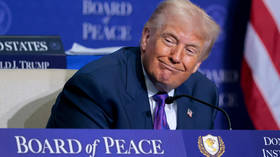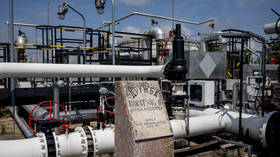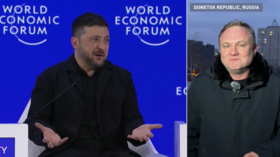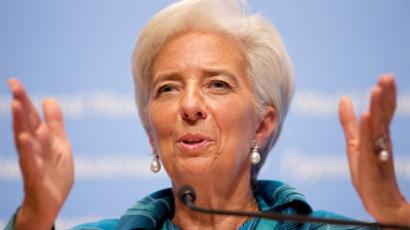'EU like an abusive relationship, eurocrats pulled off autocratic coup'
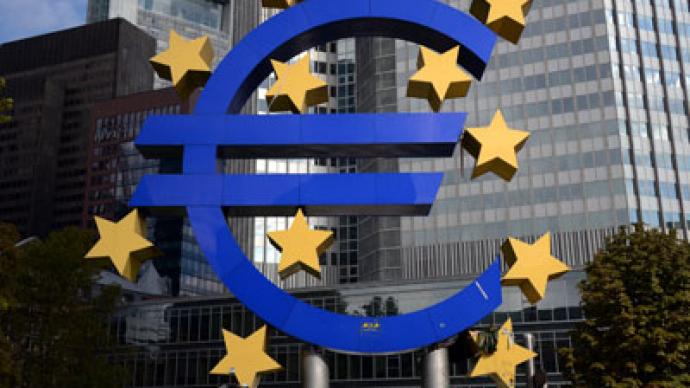
RT interviewed Daniel Hannan, a conservative member of the European Parliament who vowed to bring his euro-skepticism to the heart of Brussels. Hannan said that Brussels exploited the eurozone crisis to effectively mount a coup d'etat.
RT:Mr. Hannan, thank you for talking to us. Now, apparently in Brussels there is a popular joke which says that if the EU was a country applying to join itself it'd be rejected for not being democratic enough.Daniel Hannan: It’s an amazing thing. And we’ve stopped being amazed by it simply because of familiarity, but we should be shocked by it. That the only body that can propose new legislation in the EU is the unelected European Commission. If any country will run like that, if supreme power were wielded by 27 people who were immune to the parliament vox that would be regarded as deranged. And the people who talk most fervently about turning the EU into something like a super-state are remarkably relaxed about the undemocratic nature of it. And from the basic lack of democracy you get the contempt for popular opinion, you get the way of the sides of referendum results if they go the wrong way, you get the sense that public opinion is an obstacle rather than a reason to change direction. It’s an extraordinary and sad paradox that 27 countries, each of them liberal parliamentary democracy in its own right, have come together and accepted a system that would make Zimbabwe look democratic. RT: How did that happen exactly? DH: I think the origins actually go back to the very beginning of the EU. The founding fathers had had a very mixed experience of democracy, especially of the referendum, plebiscitary kind of democracy that had existed in the 1930s. They saw democracy as a potentially dangerous force that could lead to demagoguery, to fascism, to war. They were quite open about deliberately vesting supreme power in the hands of wise technocratic experts who wouldn’t have to worry about public opinion, who would be able to make the tough decisions, and of course there is no such person as the wise disinterested expert. They will have their prejudices, the will have their assumptions. Freed from the constrains of public opinion, they were able to get on with creating an almost autocratic system which has stayed in large measure in place to this day which is why, you know, when people vote against it that is seen as the beginning of the argument rather than as it would be in a proper democracy – the end of the argument.RT:You’ve recently released a book under the title 'A doomed marriage,' which is about the relationship between the EU and the UK. Why did you decide to call the book that?DH: Yes, the subtitle is 'Britain in Europe.' It’s not a marriage guidance piece. Although it’s an interesting one. I read a review of a work by a marriage guidance counselor, I didn’t read the book, but the review said something fascinating. It said that a relationship can take a lot of arguing. Rows are not a bad thing, because if you’re arguing with your husband or wife, it suggests that you care enough about his or her view and you want to change it. It’s when the rows give way to contempt. When the stormy sessions fall silent and give way to scorn that the relationship is over. I think something similar has happened even in the time when I’ve been an MEP. When I was first elected, constituents would write to me very angrily and say “Outrageous that the budget is unapproved, outrageous that all the money has been spent on the agricultural and foreign aid, outrageous that the system is so undemocratic.” And now what you get much more often is, “Yes, what do you expect? The whole system is rotten.” And that’s when you realize that the marriage is over. And I think that it’s just the question of time and how we negotiate the most amicable divorce. RT:You’ve even gone as far as to call the relationship between eurocrats and the ordinary voters abusive…DH: Yes, in the sense that the ordinary voter is seen as an inconvenience, as a problem. When I think back to the way in which the French and Dutch referendums were greeted six years ago, every single speaker, with two exceptions in the entire European Parliament, stood up and said, 'How do we get around this problem? Why did we get it wrong?' And I remember that eerie poem by Bertolt Brecht where he says, 'Wouldn’t it therefore be easier to dissolve the people, and elect another in their place?' It didn’t occur to anyone that the people had spoken, and therefore, the politician should listen.RT: Talk to me about your assertion that it was Brussels-backed coups that toppled George Papandreou in Greece, and Silvio Berlusconi in Italy. What proof do you have of that?DH: In two countries, an elected Prime Minister was removed from office, and replaced with a technocrat, who has never stood for office in his life. Not just a technocrat, but a eurocrat. In Greece, it was the former vice president of the European Central Bank, in Italy it was former European commissioner Mario Monti who, as well as appointing himself prime minister, appointed himself finance minister, giving a whole new meaning to the phrase 'the full monty,' and didn’t have a single elected politician in the Italian government. Both – in the case of the Papademos administration in Greece and the Monti administration in Italy – said they were national governments, that was the phrase used. And yet, the whole purpose of these governments was to push through a program that would be rejected by the nation in a general election. So, if you like, the last shreds of pretense were shed, the velvet glove was taken off, and the iron fist underneath was unsheathed. Then you have what was always implicit, but is now explicit, which is apparachiks in Brussels ruling directly through apparachiks in Rome and in Athens, with the people and their elected representatives cut out altogether. I saw last week that Mario Monti said he might seek a second term. I don’t remember him seeking a first.RT:From your description it sounds terrifyingly easy for Brussels to do that. What steps do eurocrats have to take?DH: These were civilian juntas. It is true that the letter of constitutional propriety was observed in the sense that the parliament in both cases endorsed a new government. That’s the case with every dictatorship, starting from Napoleon. They always managed to get the parliamentary vote in their favor. The reality is that we’re dealing with administrations that have been imposed on countries because keeping those countries in the euro was more important than allowing them to vote for the policies they want.RT: We do appear to be drawing nearer to a referendum on whether the UK should stay in the European Union. What would it take, do you think, for the government to take that final step?DH: Well, politicians, in my experience, feel the heat before they see the light. I don’t think any political party likes referendums to be honest, because politicians are instinctively mistrustful of a process whose outcome they can’t control. Nonetheless, they all see that there is big public demand. People want to be consulted, they feel that it’s a huge issue, of what country you want to belong to. And that it’s insulting and wrong not to allow people the referendum, which all three parties were recently promising, and which all three have managed to draw back from. I’ll go as far as to say that the party which gets there first will win the next election. The people, who feel strongly about this, may be a minority, but they are not an insignificant minority, and it’s a vote-determining issue for a chunk of the electorate. It’s almost, I suppose, like a kind of game theory, like a prisoner’s dilemma. Neither a party desperately wants a referendum, but neither can afford to let the others get there first.RT:What kind of referendum do you support? A simple, in or out, or a more complex construct?DH: I think, ultimately, there’ll have to be an in-out referendum. I think that’s the only one that makes sense. You can’t offer people something that you haven’t negotiated, or something that isn’t in your gift to deliver. I mean, if you had a referendum and said, 'Wouldn’t it be great if we opted out of the foreign areas, but remained in the free market?' You’ve no idea whether the EU is going to give you that, so that’s a meaningless question, unless the renegotiation is completed by then. And that’s how I think it should happen. Let me be as generous as I can to the people who want to stay in, and as fair about this as I can. If the problem is timing, and what is going to emerge from the eurozone crisis, because that’s what we’re told, no-one now admits to being against the referendum, what they’re now saying is, “Now it isn’t the right time; we’re going to see what emerges.” If that’s the case, then pre-announce now and pre-legislate now for a referendum to take place, say in 2016. That’s plenty of time. You will have then got four years – you, supporters of membership – to come back with a deal that you reckon you can sell to the British people. And the fact that you pre-announced the referendum means that all the other members understand that if you don’t get a deal you can sell to the country, the alternative is that we leave, and negotiate something differently from the outside. I think if you did that, then it is even possible that you could succeed in getting something along the lines of the Swiss deal without calling it leaving. It becomes then a presentational question whether you call it an associate membership or something else. But what is absolutely certain, is that if our own civil servants and is the other member states do not understand that it’s either a renegotiation or exit, there will be no significant improvement in our terms of membership.RT:The result of a referendum is by no means a done deal. Would the people vote to remain in the EU – or perhaps worse still, if they don’t vote at all, as has happened in the past in European elections?DH: I have absolutely no idea how people would vote. I mean, having just excoriated the European Union for its lack of democracy, it would then be rather hypocritical of me to say, 'Well, I only want a referendum if I think I’m going to win it.' The point is almost everybody in the public life approaches this question by guessing at the outcome. And they’re trying to work back, 'Well, okay, if you think people are going to vote to stay in.' Surely, somebody should stand back and say, 'Is this right in principle? On an issue of this magnitude, isn’t this just the right thing to do, to let the country decide?' I mean if we’re pissed at everybody with a vote on the precise method by which they return their member of parliament, how can we turn around and say that they are not allowed to vote on whether those members of parliament get to ruling the country?RT:What about what all three parties are saying at the moment, which is, “We’ve got this crisis going on, the main priority should be to reduce the deficit. We don’t have the time or the inclination now to talk about the EU referendum”?DH: It’s wonderful, isn’t it? We were told for twenty years that now was not the right time for a referendum because Europe wasn’t an issue. Now they say, 'Now it’s the wrong time because Europe is an issue!' I mean, with the eurozone crisis – it’s an ultimate yes-minister argument. You know, 'It’s a perfectly good idea, minister, but now it’s not the most propitious occasion.' If not now, when? The eurozone crisis has wrecked the premise on which we joined. It’s falsified our membership terms. Europe is collapsing as a share of our exports. The rest of the world is increasing almost by the minute as a share of our trade. The reason that we went in in the first place, in early the '70s, and the argument that has been deployed for nearly forty years, has now been made redundant by collapse of the Eurozone economy, and the mulish insistence of eurozone governments on exaggerating all the policies that have created the crisis there. Now it’s time to raise our eyes to more distant horizons and re-embrace the wider world.


